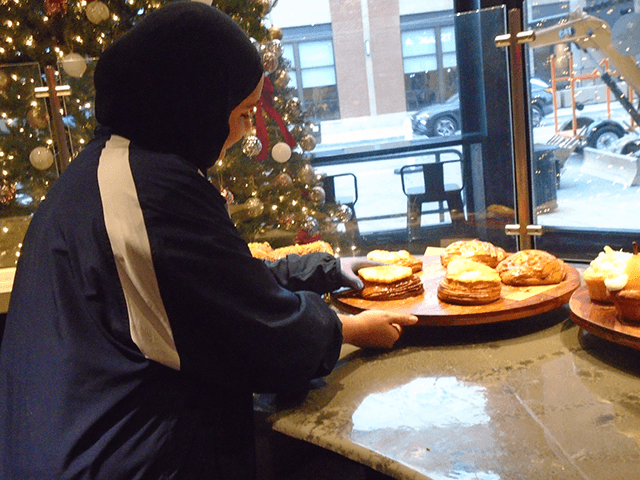
Pierogis. Shawarma. Bratwurst. Sushi. Collard greens. Empanadas. Can’t you imagine the delicious tastes offered by each of these foods?
Need a bit of sweet? We could add: Biscotti. Kolache. Chocolates. Baklava. The list of our food preferences has expanded and internationalized quite naturally. We see what others are enjoying. We try it. We like it.
We are nourished by the great variety of cultures that surround us.
In the Northern Hemisphere during November and December we experience the movement of darkness overcoming light. We are more aware of darkness and danger lurking around us. We need to be reminded of the “promise of hope.” We long to acknowledge – celebrate, even – good overcoming evil, knowledge enlightening ignorance.
Numerous cultural holidays offer responses to this reality. Most familiar to us may be the Christian traditions of the Advent/Christmas Season. One prominent symbol is the Advent wreath, with its four candles, each representing Jesus coming as the light in darkness. We recognize the eight-day Jewish holiday of Hanukkah – the Festival of Lights. A central part of the ritual is the lighting of a nine-branched menorah each night, recalling one day’s worth of oil still burning during battle.
We encounter Buddhists, Hindus, Muslims, and others with their holidays and traditions. All of them offer ways to deal with darkness, ignorance, and evil. We are slowly becoming aware of them and learning of their rituals, traditions, and special foods. To mention only one: Diwali, the Hindu festival of lights. Shared by Jains and Sikhs, victory of light over darkness, good over evil, and knowledge over ignorance is celebrated.
We are nourished through the great variety of cultures that surround us. They offer us rituals and symbols to draw forth the light, the good, the knowledge, the hope that is in our midst.
Pope Francis knows of the significance of culture and the tools offered for addressing environmental problems. In Laudato Sí he writes “Ecology, then, also involves protecting the cultural treasures of humanity in the broadest sense.” LS #143 He continues, “Culture is more than what we have inherited from the past; it is also, and above all, a living, dynamic and participatory present reality, which cannot be excluded as we rethink the relationship between human beings and the environment.” LS #143
LS #143 begins with a consideration of the term patrimony, “that which has been passed down from previous generations, inherited.” He writes, “Together with the patrimony of nature, there is also an historic, artistic and cultural patrimony which is likewise under threat. This patrimony is a part of the shared identity of each place and a foundation upon which to build a habitable city…. there is a need to incorporate the history, culture and architecture of each place, thus preserving its original identity.”
We are reminded of the need to involve all members of a community at the local levels for authentic and integral problem solving. “New processes taking shape…. need to be based in the local culture itself. There is a need to respect the rights of peoples and cultures, and to appreciate that the development of a social group presupposes an historical process which takes place within a cultural context and demands the constant and active involvement of local people from within their proper culture….. quality of life must be understood within the world of symbols and customs proper to each human group.” LS #144
If people are deprived of the nourishment provided by their “cultural identity” or denied “their sense of the meaning of life and community”, they will not be able to provide fresh insight and energy to address the needs of this time and place.
Laudato Sí continues, “The disappearance of a culture can be just as serious, or even more serious, than the disappearance of a species of plant or animal.” LS #145
As we progress through this time of year, touched by the variety of cultural holidays being celebrated, savoring the additions to the food offerings of our childhood, remember that “we use our environment as a way of expressing our identity.” LS #147 May we reverence the cultures that have been entrusted to us.
Suggested actions:
• Try a new food. Explore the culture that offers it.
• Revisit your own cultural heritage. Prepare a food to share with others.
